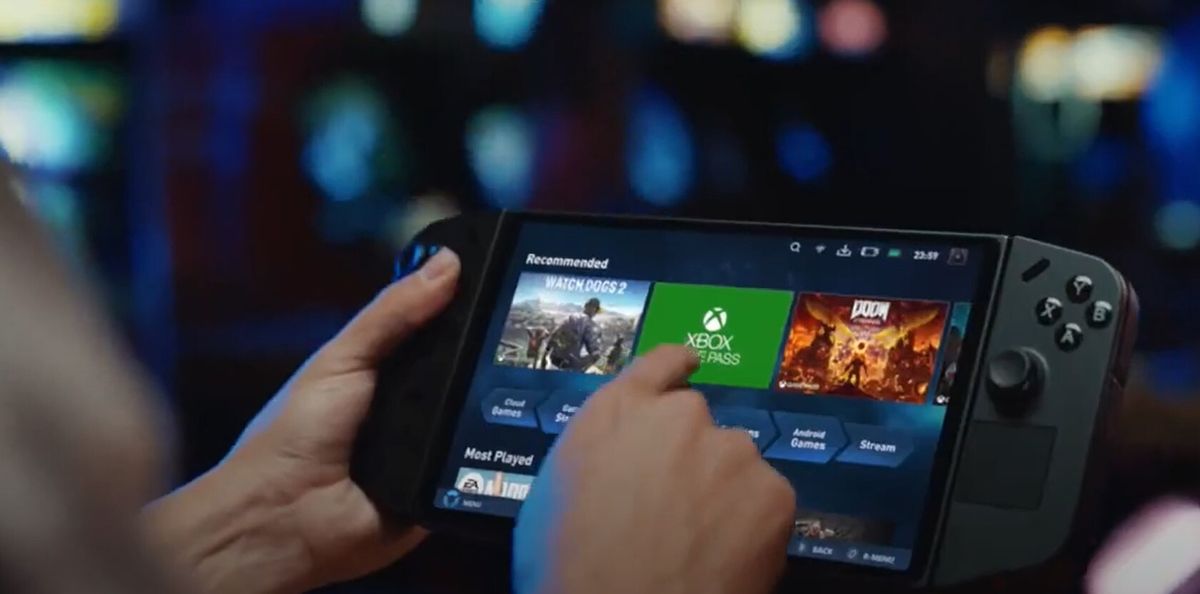Lenovo's leaked 'Legion Go' handheld features Xbox and PC Game Pass heavily
Hi-Fi Rush, Ghostwire Tokyo, and Halo: Infinite are all prominently featured in the leaked trailer.

What you need to know
- The Lenovo Legion Go handheld has had yet another leak, this time for a marketing video showing the Windows 11 based handheld in action.
- The trailer focuses heavily on Xbox titles that are a part of Xbox and PC Game Pass.
- Hi-Fi Rush, Ghostwire Tokyo, and Halo: Infinite are among the games shown in action on the device.
The Nintendo Switch undeniably sparked a handheld gaming console revolution, and as a result, we now have the likes of the Steam Deck, the ASUS ROG Ally, and the PlayStation Portal. We recently mentioned that the PlayStation Portal could be used to play Xbox Game Pass games via the cloud with some determination and elbow grease, but you may not need to rely on PlayStation's handheld for a portable Xbox, according to a leaked marketing video from Evan Blass (aka @evleaks) for the Lenovo Legion Go.
There have been plenty of calls from Xbox fans about the need for an Xbox handheld, but it seems more and more likely that Microsoft has been content to let third-party manufacturers fill the space and support those devices via Xbox Game Pass. The leaked video for the Lenovo Legion Go seems to support this marketing strategy further, as many Xbox Games Studios titles and the Xbox Game Pass logo are prominently featured in the marketing. Early in the video, we see a person click on the Xbox Game Pass app tile, while gameplay shots from first-party Xbox games Hi-Fi Rush, Halo: Infinite, and Ghostwire Tokyo are all shown throughout.
Hi-Fi Rush shows up early in the video as the Legion Go's 8.8-inch, 144Hz VRR display, and the onboard Ryzen Z1 processor are showcased. Title cards for Starfield and Ghostwire Tokyo show up alongside cards for Assassin's Creed Odyssey and Far Cry 5 from Ubisoft as the Legion Go's detachable Switch-like controllers and built-in kickstand take center stage.
Halo: Infinite's multiplayer appears in the leaked video when the Legion Go's expandable storage option is shown, which can hold up to 2TB of MicroSD storage, and the "whisper quiet" fan system with top exhaust ports. The video also introduces the Legion Go's FPS mode and controller bases, which are included with the Legion Go but not required when using FPS mode. These controller bases make the detachable controllers behave like old-school joysticks. Hi-Fi Rush then takes center stage again as the marketing video points out that the Legion Go will have a 49.2WH battery and lightning-fast charging.
In what may be the big twist of the marketing video, however, we learn that the Legion Go can pair with Legion AR glasses to take your Game Pass games to a whole new dimension. Microsoft's own in-house AR hardware, Hololens, has been quiet as of late, but a recent patent and support for Lenovo's Legion AR glasses may point to a softening of Xbox Game Studios' AR/VR stance.
As recently pointed out by Jez Corden, Microsoft has been gearing up to support OEMs in the handheld space and was hands-on with Lenovo's efforts for the Legion Go. It is likely that the Lenovo Legion Go will not be the last we see using Xbox Game Pass as a promotional point as more handhelds make their way to market.
Get the Windows Central Newsletter
All the latest news, reviews, and guides for Windows and Xbox diehards.

Cole is the resident Call of Duty know-it-all and indie game enthusiast for Windows Central. She's a lifelong artist with two decades of experience in digital painting, and she will happily talk your ear off about budget pen displays.
-
fjtorres5591 Saw the video.Reply
That is no leak.
It's an ad campaign...
The video is too slick to be in-house or ad agency demo.
More to come and soon. -
Iamdumbguy Ugggh...everyone's wants to make the exact same hardware while noone is actually making the software these things need.Reply -
fjtorres5591 Reply
Hardware is mixing and matching OEM components.Iamdumbguy said:Ugggh...everyone's wants to make the exact same hardware while noone is actually making the software these things need.
(Let's face it: AMD is doing the heavy lifting here.)
Software is more complicated. Takes longer.
Give MS a bit more time. They're coding as fast as they can. 😅